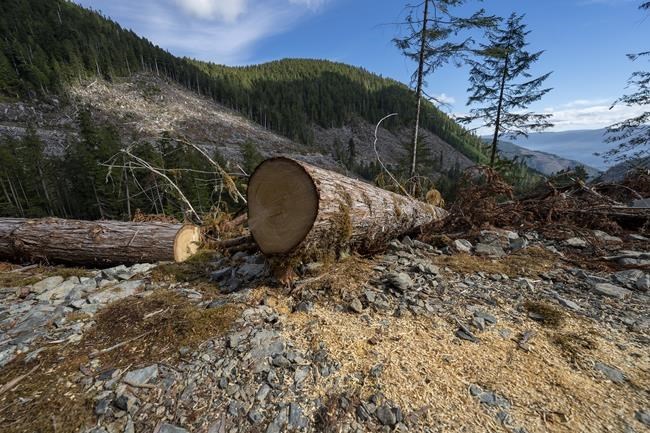VICTORIA — British Columbia will consult First Nations about deferring the logging of big, ancient and rare old-growth trees across 26,000 square kilometres of forests.
The provincial government announced Tuesday that an independent panel of scientific experts has mapped priority areas and it's asking First Nations to decide within 30 days whether they support the deferrals or require further discussion.
B.C. is following the recommendations of an independent review released last fall, which found inaction could result in permanent loss for the most at-risk old-growth ecosystems, Forests Minister Katrine Conroy told a news conference.
The government will immediately stop selling BC Timber Sales licences in the priority areas identified by the panel, Conroy said, and further deferrals will be determined through agreements with Indigenous nations.
Forest licence holders may then volunteer to stop harvesting in the specified areas, or the deferrals would be implemented under the Forest Act, which allows for a pause of up to 10 years, with compensation required after four years.
The initial deferrals would last two years, Conroy said, allowing for consultation with First Nations about old-growth management in their territories.
After that, old-growth forests identified as being at risk would either remain off limits for logging or be included in new, more sustainable management plans.
An analysis by the government found that up to 4,500 jobs could be affected if logging is permanently deferred across all 26,000 square kilometres, Conroy said.
The province is working on programs to help affected forestry workers and communities, she said, including skills training opportunities, bridge funding for workers near retirement and supports for local job creation.
Details on support programs are coming in the weeks ahead, Conroy said.
Susan Yurkovich, president of the B.C. Council of Forest Industries, said in a statement the plan would have a "profound and devastating impact" on the industry, which provided more than $4 billion in revenues to the province over the last year.
The council's initial analysis suggested the deferrals would result in the closure of between 14 and 20 sawmills, two pulp mills as well as manufacturing facilities, representing about 18,000 jobs and $400 million in annual revenue, Yurkovich said.
MLA Mike de Jong, who held the forestry and finance portfolios under previous Liberal governments, rose in the legislature Tuesday to ask Conroy whether her government would release a detailed analysis of the deferral plan so the public can understand how many mills and jobs could be affected.
Conroy responded that the government has a new vision, where the oldest forests are protected, where Indigenous Peoples are full partners in their management, and where innovation in the forestry industry will sustain jobs for generations to come.
A series of environmental organizations also weighed Tuesday. Statements from the Wilderness Committee, Ancient Forest Alliance, Stand.earth and Endangered Ecosystems Alliance said they were encouraged over the government's use of scientific analysis to identify at-risk old-growth forests, but emphasized that thousands of square kilometres remain available for logging.
While B.C.'s deferral plan includes more than $12 million over three years to support First Nations through the process, the statements also say more funding is needed to ensure nations and other communities have the economic support they need.
Adam Olsen, a Green Party MLA and member of the Tsartlip First Nation, said in a statement B.C. didn't properly consult with First Nations prior to releasing details on the deferral plan and now it's giving them just 30 days to decide if they support it.
"I'm relieved to see funding tied to this tight timeline, but so far, First Nations have been very clear that they do not feel adequately heard on forest management."
B.C.'s announcement comes as world leaders pledged to end deforestation at the United Nations climate conference in Scotland. Prime Minister Justin Trudeau told media there that Canada has a responsibility to protect forests as global temperatures rise.
Also Tuesday, B.C. updated its calculation of how much old-growth remains in the province based on data gathered in 2020-21.
The scientific advisory panel found 111,000 square kilometres remained, down from 137,000, and it broke the remaining old-growth down into three categories to guide the deferrals: big, rare and ancient old-growth trees.
It calculated 62,000 square kilometres of forests with big trees, of which 21,000 were already protected, and recommended the deferral of an additional 17,000 square kilometres.
It recommended the deferral of all remaining ancient old-growth for a total of 6,000 square kilometres, and all remaining 8,000 square kilometres of rare old-growth.
The logging of old-growth forests has created friction over the last year, with a court injunction against logging protests in the Fairy Creek area on southern Vancouver Island resulting in more than 1,150 arrests by the RCMP since May.
Earlier this year, B.C. had announced the temporary deferral of harvesting across 196,000 hectares of old-growth forests in nine different areas next fall.
Conroy introduced a bill last month to amend B.C.'s Forest and Range Practices Act, which she said would reshape forest management. A new system of forest landscape plans developed in partnership with First Nations, local communities and others would prioritize forest health, replacing the current system of stewardship developed largely by industry, she said.
The province has been working with the forestry industry on those changes, which are expected to come into effect over the next year, Conroy said.
— by Brenna Owen in Vancouver
This report by The Canadian Press was first published Nov. 2, 2021.
The Canadian Press



